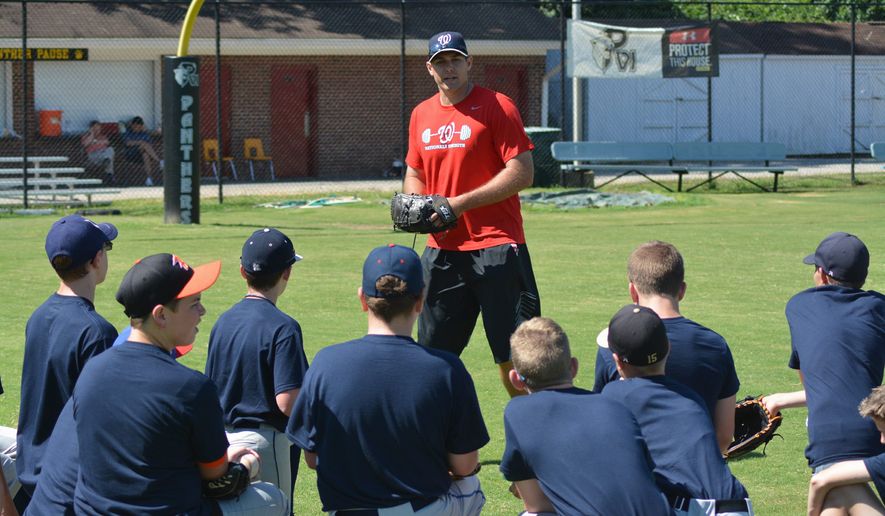If God is not the reference point for sports, sports will unavoidably devolve into idolatry, worshiping man as a demigod. This has been our experience over the past many years in sports, as all of its problems — such as fan violence, domestic violence, illegal performance-enhancement substances, excessive commercialism — are traceable to the unfortunate de-emphasis and removal of God from sports.
Our society incorrectly puts star athletes on a pedestal of fan and media adulation and then feigns surprise and disappointment when the athlete falls or is pushed from that pedestal.
Further, the world of sports is currently adrift in a secular free fall, and some cogent commentary suggests that sport has become a religion in and of itself. If this sounds hyperbolic, consider some facts.
Naming has always carried great significance to Christians. Recently, a couple in the United States named their child “ESPN” in honor of the ubiquitous worldwide sports network. Similarly, from the catacombs to Christian cemeteries, burial of the dead has also carried great spiritual significance. In 2012, NBC sports reported that many sports fans were now being buried in NFL and MLB team logoed coffins. Excessive hero worship of prominent athletes may be fairly equated to deification. An academic study at Murray State University concluded that sports, with its rituals and psychological attachments, has many of the same effects on spectators as religion does!
Jesus’ teachings often turned the prejudices, customs and traditions of his day upside down to set them right side up. For example, he explained that the Sabbath was made for man and not man for the Sabbath. Similarly, sports are made for man and not man for sports. A proper understanding of sports requires a radical change of emphasis to see sports as a true gift from God.
With this Godly perspective, we may begin to take the many relevant Scriptural passages and church teachings and assemble them as the foundation for a coherent faith-based approach to sports. For example, Saint Paul’s epistles are rich with sporting analogies; these analogies, of course, point to more important spiritual realities of salvation and eternal life.
Perhaps the best description of sports ever written come from Pope Pius XII in “Sport at the Service of the Spirit,” July 29, 1945: “Sport, properly directed, develops character, makes a man courageous, a generous loser, and a gracious victor. Sport, rightly understood, is an occupation of the whole man perfecting the body [and] the mind to be subservient to the service and praise of his Creator.”
In other words, we need to turn our current perception of sports upside down, which will only serve to stand it right side up. Instead of its current maniacal focus on winning at all costs, the balanced and historic perspective of valuing competition for its own sake must be reintroduced.
Further, famous athletes have historically accepted and even appreciated being considered role models. More recently, basketball legend Charles Barkley famously opined that athletes are not and should not be viewed as role models, and most of the media focus their gaze on athletes who engage in disreputable activity.
Yet, the sports world continues to produce excellent role models such as Mike Piazza, Simone Biles, Tim Tebow, Clayton Kershaw, Russell Wilson, Philip Rivers and Mike Sweeney, even though their positive example usually garners little public notice.
Tim Tebow created a major controversy a few years ago by simply kneeling in prayer during his games. While he was most likely attempting to provide a strong witness to his Christian faith, fan reaction and some media coverage of his prayer on the field focused on the efficacy of the prayer. For church leaders, it presented a teachable moment on prayer. Asking whether prayer leads God to favor one team or player over another in a contest reveals a fundamental misunderstanding of the purpose and value of prayer. It implicitly reduces prayer to petition (asking God for a gift) and ignores the other significant purposes of prayer — worship, thanksgiving and forgiveness.
While our disordered sports and media culture inevitably views all things in terms of their immediate, tangible benefit, Tim Tebow’s witness allowed thoughtful observers to discuss and explain more significant aspects of faith in sports.
Like Tim Tebow, faith-filled athletes, coaches and other participants in sports need to consciously speak and act provocatively to convey that God remains at the center of their sporting activities. In this regard, they must learn a lesson from the marketing genius of Nike, which has taken Christocentric themes such as “Cross-Training and Witnessing” and used them to sell shoes and sports gear.
Christians and all faith-filled believers must reclaim sports by placing God at its very core and believing everything else will fall in its proper order.
• Ray McKenna is the founder of Catholic Athletes for Christ, a Catholic sports ministry (catholicathletesforchrist.org). He is a Washington-based attorney, husband and father of seven children.




Please read our comment policy before commenting.